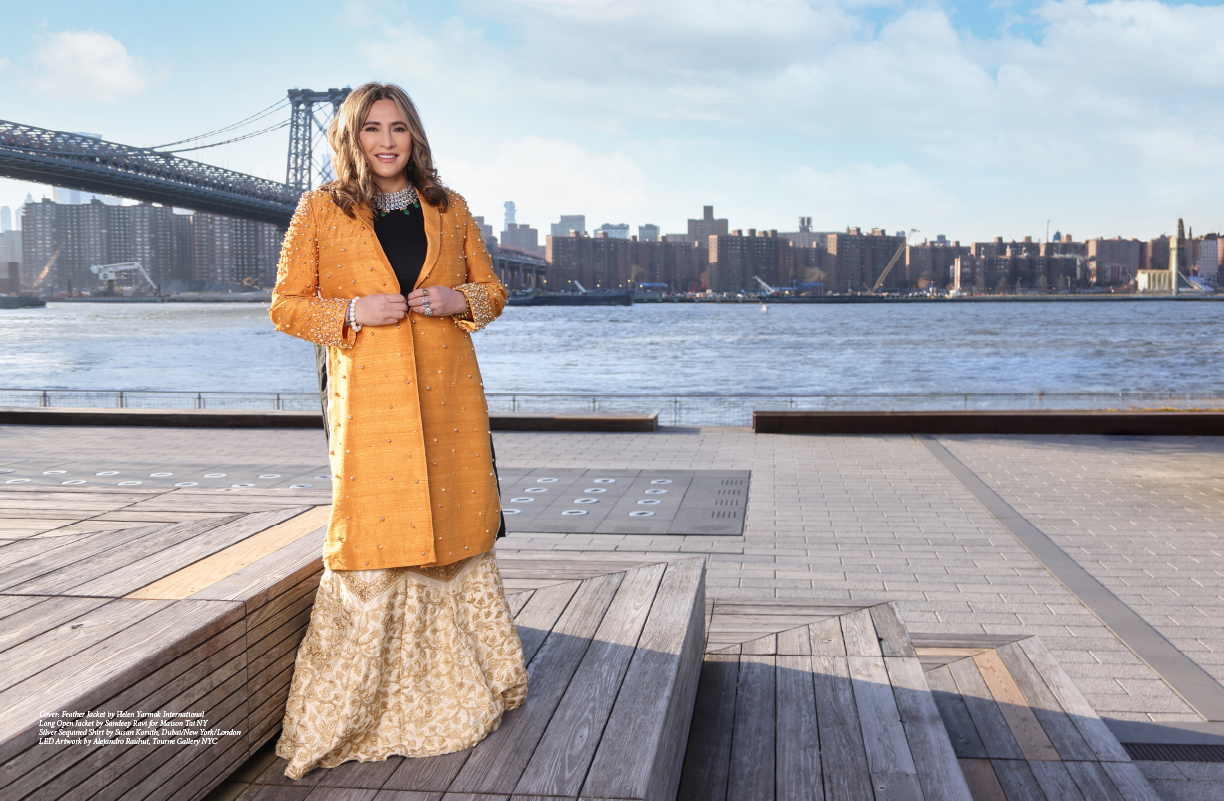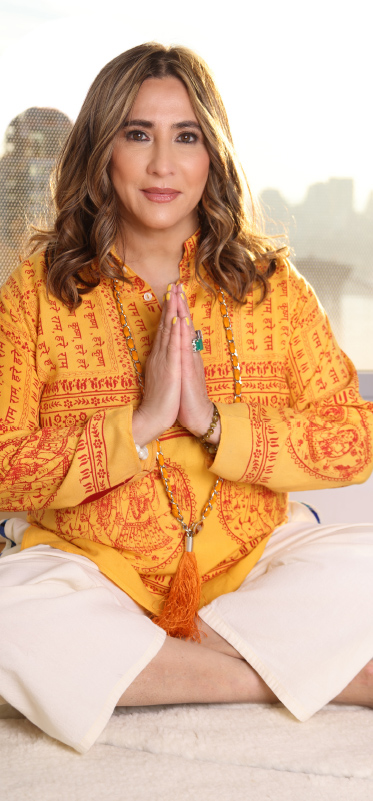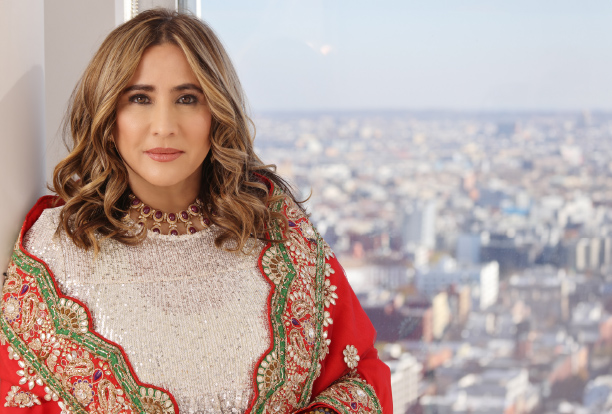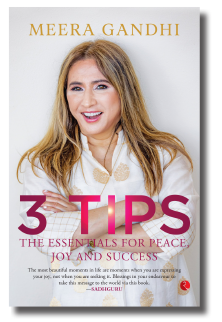MEERA GANDHI
“We All Need Love And Kindness To Thrive!”

When you meet Meera Gandhi, the first thing that strikes you is her radiance and high-energy spirit. Despite her place as a humanitarian activist and CEO of The Giving Back Foundation, she mingles daily with the who’s who of global society—from New York to London to Istanbul to Dubai and Mumbai. Her endearing persona puts you at ease immediately. One day, Gandhi will raise a toast with Bill and Hillary Clinton, Kerry Kennedy, or Elton John; the next day, she’ll be pictured with underprivileged children in Mumbai, spreading her many grassroots projects for them.
RAISING AWARENESS
Rather than using her privileges and connections to live a life of leisure, Gandhi prefers using her resources to raise awareness and funds for others in need. Indeed, this remarkable woman has made it trendy to be charitable.
Gandhi, the daughter of an Indian naval officer and his Irish-born wife was raised in Mumbai and was influenced by Mother Teresa, whom she met in her teens. During the last two years of high school, she spent weekends volunteering with disabled children, caring for them in a vast ward. Playtime and teaching them to dance were also joyful. The sixteen-year-old high schooler was incredibly moved by the compassion with which Mother Teresa treated everyone who came to her. “I think what I learned subconsciously from Mother Teresa was that she was always happy. She was always unfazed.”
Selfless even then, Gandhi tutored underprivileged children in after-school programs herself. Several years later, she entered Delhi University, earning her bachelor’s degree in economics. She obtained an MBA from Boston University and continued her higher education with an executive education program degree from Harvard Business School. This has equipped her with the tools required to launch ambitious projects. What drew Meera back then was the need to give back to society and those less fortunate than her. “We are to the universe only as much as we give back to it,” she says.
PROVIDING HAPPINESS
Gandhi launched The Giving Back Foundation in 2010 with that inspiration to fuel her desire. The Foundation has partnered with over seventy-five charities in five continents, from the Robert Kennedy Foundation to Women Helping Women. These charities and more were featured in her first book, Giving Back (2011), with all proceeds donated to charity. She believes in the art of giving. She knows that when we provide happiness for others, it will come back to us in the satisfaction that we have contributed to making someone’s life better. The Giving Back Foundation focuses on developing women and children through education. Apart from its charitable projects, the Foundation provides awards and honorariums to teenage students.
Naturally, the journey of giving is not always about money or material items. She feels that mental health is at the forefront today, and many times, just taking the time to listen and offer emotional support to someone in need is just as vital. The global activist believes stress is the same in the East and the West. She considers the human soul to be the same. Taking time to slow down, breathe, and meditate brings us back to our center. As we adjust, we reduce our stress. A calm mind is a quiet life!
In her latest book, 3 Tips: The Essentials For Peace, Love And Success, Gandhi explores simple methods that can easily be incorporated into one’s life. The book continues her focus on creating universally accessible and practical mental health, wellness, and spirituality resources. She notes that everyone has the answers within us. The book breaks down complex issues into three simple tips for each subject, which anyone can implement into their lives. If you’re feeling lost or need guidance, this book will direct you to a greater awareness with a greater spiritual perspective.

We recently met with Meera Gandhi, who welcomed us to learn about The Giving Back Foundation.
What inspired you to become a humanitarian?
I never really planned anything in my life. I have always gone with the flow and lived one moment at a time, trying to do my best in each moment. I was helping many New York institutions raise money, such as The Asia Society, The York City Ballet, The Hope Foundation, The Robert F. Kennedy Foundation for Human Rights, Children's Hope etc. At this time, I decided to start The Giving Back Foundation in 2010 to directly impact and interact with the people and causes that I wanted to serve. We all should be humanitarians, or at the very least, remember to be kind to all!
Tell our readers about what concerns you have when it comes to the welfare of your children and young people.
In today’s world, I feel a lot of pressure is put on children, which could cause them stress. Leaders and bosses, if they are not conscious people, can put unnecessary stress and pressure and unfair work demands on young people. Some can overburden them with unrealistic deadlines, which is quite a travesty to humanity and the next generation. My three children are driven and work extremely hard. I tell them to take time to live and slow down; take in the wonderful things nature and the planet have to offer!
With your orphanage, St. Michael’s which you began in India, what are your goals for those children whose lives depend on it?
The Church of Northern India started St. Michael’s School and boarding orphanage. It could not sustain itself, so my mother asked me to take it on and start supporting the school. So, in 2010, The Giving Back Foundation started supporting St. Michael’s School.
Who are your role models?
My mother and father are my most significant role models as well as my three children. I learn from each of them. From Kiran, aka Madame Gandhi, I know how to truly live in the moment. From Kanika, I learned how to prioritize health and fitness, and from Kabir, I learned the importance of calm, logical thought before making a decision.
Other role models are Mother Teresa, Cherie Blair, Hillary Clinton, Senator Majorie Margolies, Muhamad Yunus, Kimberly Rockefeller, Sadhguru, and Kerry Kennedy.
Describe your other future projects.
In 2024, we will add huge projects such as the Ledgewood Retreat for Mindfulness in August; The Veteran’s Mental Wellness Day on September 11; Free weekly Podcasts every Sunday to alleviate stress, and 3 Tips on Instagram. In addition, we are celebrating my latest book, 3 Tips: The Essentials For Peace, Love And Success book and, of course, St. Micheal’s School for Girls will continue to be supported by the Giving Back Foundation.

What does joyful living mean to you?
Joyful living to me is living a life when you are present and unburdened by any problems in every moment. Living like that makes for a calm, happy approach to everything. It enables one to be their best self because a joyful, clear mind can uplift others and resolve any problem. Speaking one’s truth and living authentically when we think, say, and do are all aligned. Being in this joyful state of flow starts within each of us and allows us to live a good, peaceful life and to uplift and take people up with us. I genuinely believe “we are to the universe only as much as we give back” so we need to be our truest, best, joyful, honest selves if we are to be of genuine service to our fellow human beings.
A joyous person radiates happiness and helps the world by creating positive vibrations. Everything is about energy and the transference of energy. So, we better transfer positive energy to all, as each of us is an energy source. This is why we will focus on mental wellness in 2024.
Mental well-being is what everyone is concerned about. How can society deal with the increased need to cope with this?
Human progress evolves. In the early days, there was a need for human safety and a roof over the head, then the need to sustain and feed oneself; after that, the movement was towards irradicating diseases like tuberculosis, etc. Eventually, the material prosperity made people comfortable, but people began to get unhealthy, so in the ‘70s, the physical fitness movement evolved.
Now, generations of spiritually detached humans, where families are not cohesive and the stress of a hectic life pace, coupled with competitive work environments, lack of proper nutrients, sleep, and worry about having enough income to support needs have people stressed—almost to the point of becoming mentally unstable, sad, and joyless. Add the pressure of social media, where everyone has an opinion on everyone’s life, has increased anxiety levels in people of all ages, and anxiety is at an all-time high!
Recognizing this and noting the increase in death and suicide made me concerned about where we are heading as a human race. Hence, our team at The Giving Back Foundation and I decided to focus on mental health through books, Instagram shows, Podcasts, community gatherings, and retreats where people can come together and meditate and eat healthy, nutritious meals to regain their mental strength and come back onto a path of strength and wellness. The path to good health must start here, and we are 100 percent doing our bit!
Another issue people are coping with is loneliness and a life lacking in meaningful purpose. How do you think this plays out in their mental health?
Our societal system has caused people to live in isolation, consumed by work to pay bills and make money to survive in the current setting. A hectic life, with no time to relax and enjoy the company of family, loved ones or friends, has caused people to feel increasingly isolated, lonely, and helpless. This, with the substance abuse that is prevalent from alcohol, drugs, and prescription use pushed by both doctors and pharmacies and people is destroying the psyche of people.
Furthermore, people trapped in jobs that are not suited to their personality or birth chart make people feel like they are not fulfilling their mission or true potential as they are in the wrong line of work, which is felt at a very intrinsic level. COVID may have been useful as many shifted jobs or had time to ponder their desires. But still, many languish, feeling trapped in unfulfilling jobs not suited to their real calling.

Although you’ve discussed the importance of challenging work to achieve success, many still feel it’s luck. What do you think?
Indeed, I have met many people who depend on luck, don’t work hard, and are lazy. They never get anywhere satisfying and often tell me how disappointed they are that life is not providing the opportunities they think should be theirs.
A good demeanor and kind attitude go a long way to opening doors to good opportunities rather than an entitlement attitude. It’s a combination of factors that achieve success, and the most important is a grateful attitude, which processes current success and is a stepping stone to the next level of success. I wish everyone goodness and success, and it truly comes back to me manifold.
Tell us why you feel mentorship is essential today.
It is so important to help people find their true calling. Older people can help younger people identify their passions, but our system puts older people away into nursing homes where they are not in a position to guide younger people.
The Giving Back Foundation is working at a grassroots level to bring people together to mediate, connect, move, and do yoga so the shift can happen. As more people understand what is happening and join us, the problem will hopefully resolve itself as fresh solutions are brought forward.
What is a typical day in the life of Meera Gandhi?
I wake up early and do a 35-minute meditation. Then, have a coffee and go for a bike ride or do yoga. After that, I work on emails and calls to India, Dubai, Europe followed by calls within the U.S.
Naturally, I send a follow-up to my team; we discuss the programs we are working on and complete the work associated with each project. Podcasts are recorded, edited, and emailed each week so people can benefit from the talks each Sunday and 3 Tips Instagrams. I am committed to sending these out to counteract the toxicity in the world today!
If I am not supporting other charitable endeavors in the evening, I am on the phone with my three children, parents, and extended family, as we are very close-knit. Then, after a light dinner, I meditate for about 40 minutes, and it’s sleep by 9:30 pm. It’s a similar daily routine, but each day is filled with laughter and camaraderie. Sometimes, I go for lunch with a loved one and hang out a little. When I travel, it’s much the same routine.
For more information on Meera Gandhi and The Giving Back Foundation,
visit thegivingbackfoundation.net

Another issue people are coping with is loneliness and a life lacking in meaningful purpose. How do you think this plays out in their mental health?
A hectic life, with no time to relax and enjoy the company of family, loved ones, or friends, has caused people to feel increasingly isolated, lonely, and helpless. This, with substance abuse that is prevalent from alcohol, drugs, and prescription use pushed by both doctors and pharmacies, is destroying the psyche of people.
This is why I wrote my book 3 Tips: The Essentials For Peace, Joy And Success, which will be launched in July 2024.





